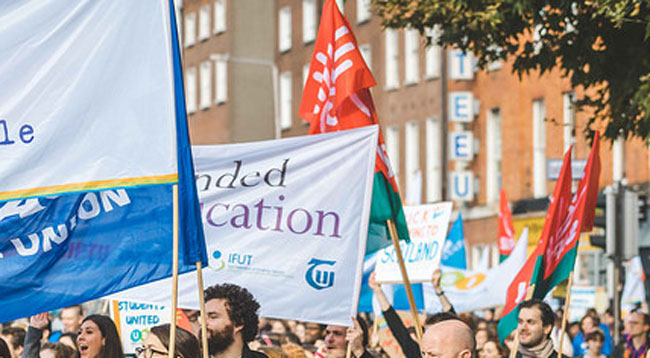The Irish Federation of University Teachers (IFUT) is to ballot its Trinity members on strike action, following the College’s decision to no longer offer permanent contracts or promotions to support and administrative staff.
A group of approximately 50 members, the majority of whom work in administration and in Trinity’s library, will be balloted first over the next two weeks to see whether they will join SIPTU and Unite in their proposed strike action again the College’s decision. The staff will also be balloted on taking industrial action.
IFUT is one of the main third-level trade unions, representing university staff across the country. This evening, Trinity’s SIPTU branch decided to defer issuing a notice of industrial action to College, pending further meetings with Trinity and the Workplace Relations Commission next month.
Speaking to The University Times, President of SIPTU’s Education Sector, Dr Jack McGinley, said Trinity had agreed to attend the meeting with the Workplace Relations Commission on April 11th, and the union would be meeting again on Monday 27th to discuss the issue of promotion and non-replacement of library and IT staff, as well as staff in Estates and Facilities.
The engagement from Trinity is a sign, McGinley said, that “people within College don’t want this to go all the way to the Labour Court”. The decision on issuing a notice of industrial action will now be deferred until the next meeting of SIPTU’s Trinity branch in April.
Speaking to The University Times, Mike Jennings, General Secretary of IFUT, said that it is “absolutely shocking what Trinity have decided”, and went on to clarify that there had been “months and months and months” of dialogue and discussion with College management, however there has been “no change in management decision”.
Speaking to The University Times by email, Dermot Frost, Secretary of Trinity’s IFUT branch, said that “voting for industrial action is not a step lightly taken by IFUT”.
“However, we have exhausted all other means of resolving this dispute with College and so have no option but to ballot at this time.”
“We are quite confident that the appropriate stage to take is to ballot the members directly affected and pending on whether that is sufficient to bring the College to their senses”, Jennings continued.
Jennings went on to say that balloting those members directly affected was like a “declaration of war” as he hopes it will speak strongly to Trinity and “bring them back to the table” for further negotiations with the Workplace Relations Commission. He went on to say that they will extend the vote out to all members if it is necessary.
Speaking about why they have decided to ballot members, following successful ballots for strike action by Unite and SIPTU, Jennings said that he believes “that we can bring significant, extra, industrial muscle to bare that the conjoining of IFUT members into the threatened industrial action of our other College unions will increase the pressure on management and we would be quite hopeful for that pressure would be effective”.
Until now, the three unions have been involved in separate talks with College, and have “not being sitting at the same table” commented Jennings.
The move follows 92 per cent of Unite members voting in favour of strike action. In an email statement to The University Times, following the result, Trinity’s Unite Local Committee Chairperson, David Grouse, said: “Both the result in favour of Industrial Action and the turnout indicate the level of anger among Unite members. Support and service staff believe they are being disrespected and are determined to challenge management.”
Earlier this month SIPTU members also voted, with 72 per cent in favour, for strike action should College management not reverse the proposed changes.
In an email statement to The University Times today, Director of Human Resources in Trinity, Kate Malone, said that IFUT informed Trinity of their “intention to ballot members in administrative, library and support grades on the employment contracts issue”.
“The University is committed to resolving this issue through local dialogue with SIPTU, UNITE and IFUT over the next fortnight and subsequently at the follow-up Workplace Relations Commission conciliation conference in early April, should matters remain unresolved”, Malone continued.
“I do firmly believe that what Trinity is doing is so outrageous that they will have no support from the Department of Education. I believe that they will have no support from any other university and I certainly believe that they will have no support from the wider community or the student body”, affirmed Jennings.
When asked if Trinity have given any reason for the proposed changes, other than financial savings, Jennings said that “this comes from the kind of ideology that thinks that workers should be absolutely dispensable, and can be hired and fired as a whim, and we certainly don’t intend to let that happen”.







